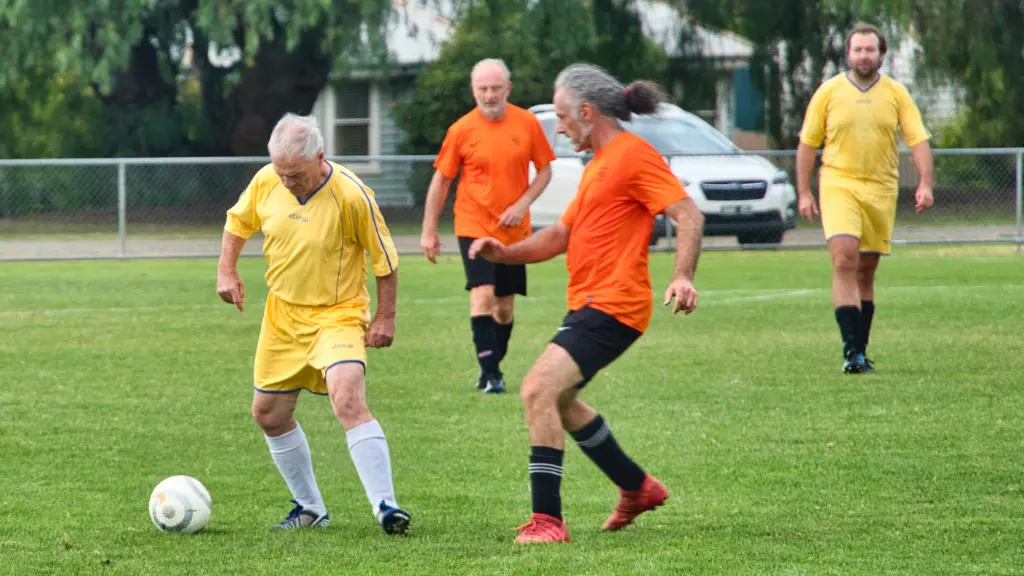Walking soccer is more than just a game; it’s a revolutionary fitness trend sweeping the globe. Designed for individuals seeking a low-impact, fun, and social way to stay active, walking soccer is perfect for all ages and fitness levels.
Whether you’re looking for a way to ease back into exercise or simply want to try something new, walking soccer is an excellent choice.
You May Also Like: Fruit of the Month: Dried Fruits
1. What Is Walking Soccer?
Walking soccer is a modified version of traditional soccer. The key difference? Players can’t run. It’s a slower-paced game that emphasizes skill, strategy, and teamwork.
Key Rules:
- No running or jogging (even when chasing the ball).
- The ball must stay below head height.
- Tackling is minimal to avoid injuries.
This format ensures the game is accessible to everyone, including seniors, beginners, and those with limited mobility.
2. The Origin of Walking Soccer
Walking soccer originated in the UK in 2011 as a way for older adults to stay active. It quickly gained popularity and spread worldwide. Today, it’s played in parks, community centers, and even organized leagues.
3. Who Can Play Walking Soccer?
Walking soccer is inclusive and adaptable.
Ideal For:
- Seniors seeking a safe, low-impact workout.
- Individuals recovering from injuries.
- Beginners looking for a non-intimidating introduction to soccer.
- Anyone wanting a social and enjoyable fitness activity.
It’s a game for all ages, genders, and skill levels, making it a community-building sport.
4. Health Benefits of Walking Soccer
Walking soccer provides a host of physical, mental, and social benefits.
a. Physical Benefits:
- Cardiovascular Health: Walking soccer boosts heart health without overexertion.
- Improved Mobility: Enhances flexibility, balance, and coordination.
- Weight Management: Helps burn calories and maintain a healthy weight.
- Low-Impact Fitness: Reduces the risk of joint stress and injuries.
b. Mental Benefits:
- Reduced Stress: Physical activity releases endorphins, improving mood and reducing anxiety.
- Sharper Mind: The strategic nature of the game enhances cognitive function.
c. Social Benefits:
- Builds connections and friendships.
- Encourages teamwork and communication.
- Promotes a sense of community.
5. How Walking Soccer Differs from Traditional Soccer
Walking soccer may seem like a simpler version of the original game, but it has unique challenges and advantages.
| Aspect | Traditional Soccer | Walking Soccer |
|---|---|---|
| Pace | Fast-paced | Slow-paced |
| Impact Level | High | Low |
| Target Audience | All ages | Primarily older adults |
| Physical Demands | High endurance | Moderate endurance |
| Focus | Speed and agility | Strategy and precision |
The slower pace allows players to focus on skills and tactics, making it just as engaging.
6. Why Is Walking Soccer Gaining Popularity?
Walking soccer is becoming a global fitness phenomenon for several reasons:
a. Accessibility
Its low-impact nature makes it accessible to a wide range of people.
b. Community Aspect
Walking soccer fosters camaraderie and builds connections among players.
c. Health Benefits
It’s an effective workout that combines cardio, strength, and balance.
d. Fun and Engaging
The emphasis on skill and teamwork keeps it enjoyable and rewarding.
7. Getting Started with Walking Soccer
Interested in trying walking soccer? Here’s how to begin:
a. Find a Local Group
Search for community centers, sports clubs, or walking soccer leagues in your area.
b. Gear Up
You don’t need much—just comfortable sportswear and supportive sneakers.
c. Learn the Basics
Attend a few practice sessions to understand the rules and gameplay.
d. Invite Friends
Walking soccer is more fun with friends or family members.
8. Walking Soccer Drills and Tips
To improve your skills, try these walking soccer drills:
- Passing Practice: Focus on accurate, low-speed passes.
- Shooting Drills: Aim for precision rather than power.
- Positional Awareness: Learn to anticipate moves without running.
Pro Tip:
Stay mindful of your pace to avoid unintentional jogging.
9. Success Stories from Walking Soccer Players
Walking soccer has transformed lives around the world.
Real-Life Story:
“I hadn’t exercised in years due to knee pain, but walking soccer changed everything. It’s low impact, fun, and I’ve made great friends along the way!” – Tom H., age 65.
Such stories highlight the sport’s physical and emotional benefits.
10. Walking Soccer in the USA
Walking soccer is gaining traction in the USA, with more clubs and leagues forming each year. States like Florida, California, and Texas are leading the way.
Upcoming Events:
Look out for walking soccer tournaments and community meetups near you.
11. Walking Soccer FAQs
Q: Is walking soccer only for seniors?
A: No, it’s suitable for all ages and fitness levels.
Q: Do I need prior soccer experience?
A: Not at all. Beginners are welcome!
Q: Can I play if I have joint issues?
A: Yes, but consult your doctor before starting any new exercise program.
Conclusion
Walking soccer is more than a fitness trend; it’s a lifestyle shift toward inclusivity, health, and community. It’s proof that staying active doesn’t have to be intense or intimidating.
Give walking soccer a try—it might just become your new favorite workout.












[…] You May Also Like: Exercise Trend Alert: Walking Soccer […]